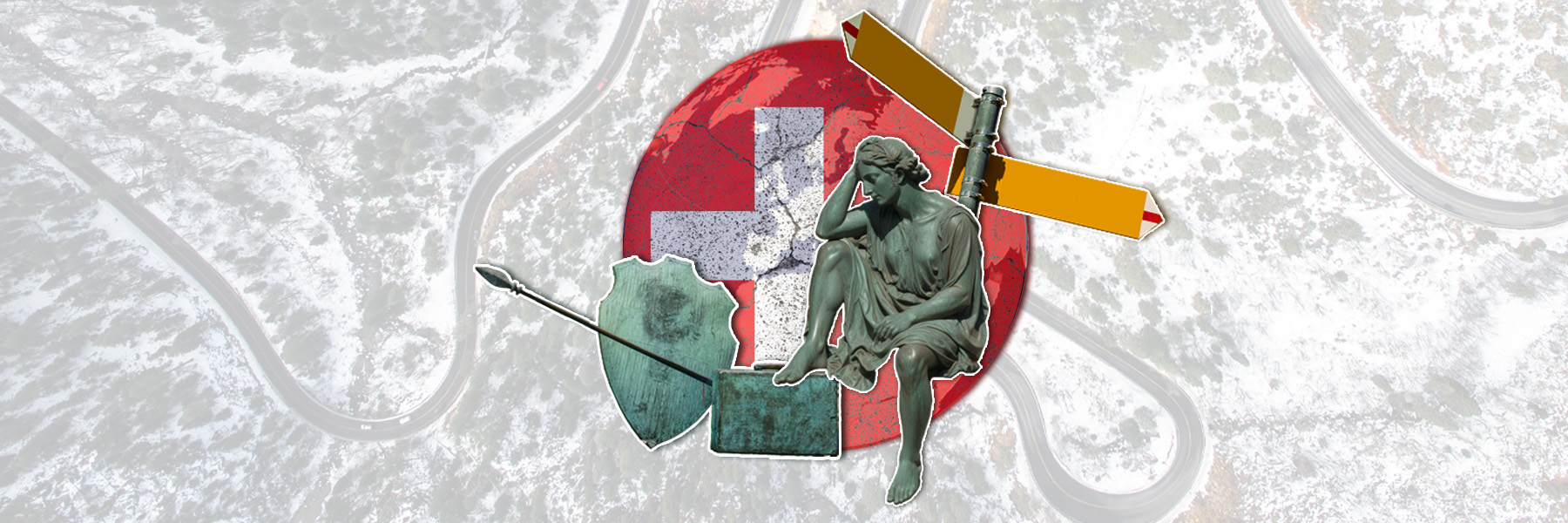
How to be neutral in a multipolar world
Only a consistent neutrality policy can create the trust within the global community on which Switzerland depends. This is why former ambassador Paul Widmer argues in favour of accepting an initiative that calls for a strict interpretation of Swiss neutrality.
The world over, Switzerland is seen as the epitome of a neutral state. But this reputation now hangs in the balance. Faced with massive pressure from abroad, our country has seemingly been thrown into disarray. Some people no longer see the point of neutrality. For others, it has become mere lip service. Anything, they believe, can be packaged under this label. Yet this is not the case. Let us take a closer look at the matter.
Neutrality is a product of realpolitik. It is about national interests, independence and security. States usually only opt for neutrality after they have suffered a bloody lesson in foreign policy. This is what happened to Switzerland in 1515 with the Battle of Marignano, to Sweden with Napoleon, and to Austria with its defeat in the Second World War.

More
Does neutrality promote peace? A look at Switzerland and its good offices
For sure, neutrality is self-serving, but this is not immoral. If all states behaved like the neutrals, peace would reign on earth. Yet this is wishful thinking. The great powers have a general distaste for neutrality. They want others to support their cause, not to stand on the sidelines. So they prefer to promote collective security frameworks, in which they get to call the shots.
Not that there is anything inherently wrong with that, either. If a global order of peace really worked, neutrality would be truly redundant. But how does collective security work today? For the most part, not at all. Hundreds of international conflicts have broken out since the United Nations came into existence. Rarely has the world body managed to resolve any of them. Its failure to do so constantly reaffirms the legitimacy of neutrality.
However, there is one truth that cannot be ignored. Like it or not, a neutral state depends on the fact that the major powers respect its neutrality. And what must it do to ensure this? There are at least three conditions.
Firstly, it must do everything it can to defend its territory by its own military means. This alone will never be enough, but a strong army is a sine qua non for ensuring respect from others. Secondly, it must fully live up to its obligations under the law of neutrality, so as to provide no pretext for intervention. And thirdly, it must be credible on the diplomatic front. A consistent policy creates trust. Only then will the advantage that a major power might seek to gain by violating this neutrality be outweighed by the resulting risk to its reputation.

More
What does the future hold for Swiss neutrality?
The adoption of sanctions against Russia
The start of the war in Ukraine was a turning point. On February 28, 2022, the Swiss government decided, after brief hesitation, to adopt the European Union’s sanctions against Russia. This was a fatal decision, and one that triggered widespread confusion. Russian President Vladimir Putin declared that Switzerland was no longer neutral. Then-United States President Joe Biden, his main antagonist, concurred. Nobody knew what Switzerland stood for anymore. Yet the Swiss government’s position should have been fairly straightforward. It should have gone down the same path as in 2014 when Russia annexed Crimea: that is, not adopting the EU sanctions, but rigorously preventing their circumvention.
Things got even worse after the failed conference for peace in Ukraine in Bürgenstock, near Lake Lucerne, in 2024. In offering its good offices, Switzerland violated its own principles of discretion and impartiality. How could the Russians be expected to participate, when the Swiss government was publicly debating whether or not to invite them and, what’s more, was openly fraternising with one of the warring parties? Little wonder, then, that Switzerland soon found itself out of the picture, with no more role to play as a peace broker.
The war in Ukraine has completely shifted the focus of our armed neutrality. On the one hand, it has strengthened our will to defend ourselves – and this was sorely needed – while on the other, it has weakened our sense of impartiality. Yet armed neutrality must rest on both: on a strong army and credible diplomacy. If the major powers do not have trust in our reliability, then being neutral will serve little purpose.
A clear path ahead
Since this trust has clearly been shaken, we must now do our best to restore it as quickly as possible. At least three measures are necessary for this.
Firstly, Switzerland must adhere rigorously to the law of neutrality. There can be no blurring of lines. We must have the courage to stand by our neutrality, even if we are criticised for doing so. This also means not supplying any warring party with war materiel. This basic position must be unassailable.
But this does not mean standing by and watching events unfold. Rather, we must free ourselves from the snare into which parliament has driven the government. Our lawmakers should amend the non-re-export declaration in the War Materiel Act as soon as possible, or even scrap it altogether. Nowhere does the law of neutrality stipulate that a neutral state must oblige the recipients of its war materiel not to sell it on to others. In other words, Switzerland should assume responsibility for its exports. As before, it should only supply weapons to non-belligerent states. But what the recipients do later with the weapons is their own responsibility.
More
Secondly, as required by the law of neutrality, Switzerland must unequivocally steer clear of military alliances. It must therefore also exercise restraint in its dealings with NATO. This is all the more important as the world moves towards a multipolar international system. As different power centres emerge in Washington, Brussels, Beijing and the key states of the Global South, reliable neutrality is likely to be in even greater demand than it was during the bipolar power balance between Washington and Moscow. It would therefore be unwise, now of all times, to jeopardise the safest guarantee of our role on the world stage.
Thirdly, Switzerland should only join sanctions mandated by the UN, not those imposed by individual states or the EU. However, it should take every precaution not to undermine their sanctions through circumventing transactions. It should thus freeze its trade and services at the level that existed before sanctions were imposed. This is a fair approach: not participating in sanctions that are not universally decreed, but also not benefiting from their circumvention.
‘Yes’ to the neutrality initiative
Switzerland has fared rather well with its neutrality. More than 200 years ago, its neutrality was recognised under international law at the Congress of Vienna and acknowledged as an instrument of peace. It emerged unscathed from the First, Second and Cold Wars. This should be reason enough to look to the future with confidence. Indeed, positive experiences help breed hope of further success.

More
How the neutrality initiative could affect Swiss policy
There is no reason today to deviate from this cornerstone of our foreign policy. However, this requires conviction and discipline. There is no such thing as half-neutrality. You are either neutral, or you are not. Only a consistent policy of neutrality can create the trust within the global community on which Switzerland depends.
With all of this in mind, I welcome the neutrality initiative, which will be put before voters in Switzerland in 2026. It sends a clear signal, both domestically and internationally. After the recent disarray seen at the highest levels of government, a “yes” from Swiss voters would be an unequivocal declaration of the fact that, even in a multipolar world, we uphold the principle that has made the very success of our foreign policy over the centuries: armed neutrality. Enshrining this in the constitution would not weaken our state. Rather, it would strengthen peace.
The neutrality initiative, put forth by an association known as Pro Switzerland, calls for a strict interpretation of Swiss neutrality to be incorporated in the federal constitution. Currently, the government and parliament are responsible for neutrality policy, which they can adapt depending on the geopolitical circumstances of the day. If the popular initiative is adopted by the Swiss population in 2026, the government and parliament would lose this flexibility.
Edited by Benjamin von Wyl. Adapted from German by Julia Bassam/gw
The views expressed by the author do not necessarily reflect those of Swissinfo.

More
Our newsletter on geopolitics

In compliance with the JTI standards
More: SWI swissinfo.ch certified by the Journalism Trust Initiative




























You can find an overview of ongoing debates with our journalists here . Please join us!
If you want to start a conversation about a topic raised in this article or want to report factual errors, email us at english@swissinfo.ch.